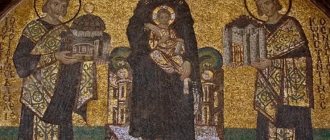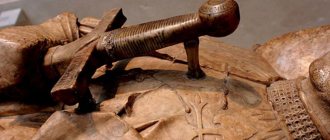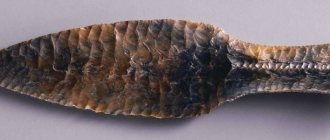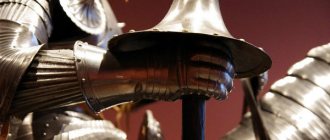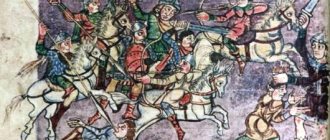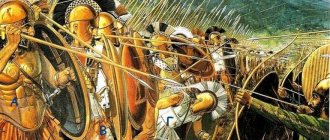The Middle Ages gave birth to knighthood - a new class, which to a certain extent became part of the development of human society, culture and technical progress. Against the background of general decadence, it was in the person of the knights that Europe received a powerful instrument for further development. The chivalric code and laws laid not only the foundations of a new military hierarchy. Knights, together with their servants - squires, represented the basis and striking force of any army. This, in turn, left its mark on the subsequent formation of cultural traditions and national customs. Personal valor, honor and human dignity are elevated to the rank of the highest virtues of men of noble families.
Before becoming a knight, a young man had to pass the test of fire and sword, to prove by his actions the right to bear such a title. Becoming a knight meant devoting yourself entirely to serving God and the king, becoming a defender and preacher of the Christian faith, a champion of high morality. Accordingly, being in the service of a knight was considered an honorable duty. In some countries of Western Europe, a squire had a fairly high status, comparable in weight to minor nobility. Moreover, in most cases, preparation for knighting involved the presence of a certain ritual, service as a squire of one’s patron, mentor and master.
How could one become a squire?
A servant-squire in England, France or Germany was far from a simple person. All applicants for this position had to be of noble birth and, as a rule, have served for about 5-7 years as pages under a noble knight or king.
A future squire in England became a page at the age of 7-10. The sooner he managed to do this, the more skillful a knight he could become later. The boys had to carry out all the tasks that the owner of the castle assigned to them.
These included:
- Cleaning;
- Serving at table;
- Accompaniment of the knight and his family members.
Since most of the pages were relatives or children of friends of the owner of the castle, they were taught the following wisdom:
- Court manners;
- Swimming;
- Fight;
- Basics of gun ownership.
After a young page began to fulfill his duties impeccably, he could count on receiving a higher status - a squire.
Each knight's squire in England could hold one of the following positions:
- Be a valet;
- We are catching;
- Horsemen;
- Kravchim and occupy other similar positions that the knights entrusted to them.
The personal squire of a knight in England was the most significant in the entire system of squire positions.
Modern period[edit]
Today the term squire
has
a clear
definition only in jurisdictions such as Canada, Ireland, Spain and the United Kingdom, where heraldry is regulated by the state or a heraldic body such as the College of Arms, the Chief Herald of Canada, the Lord Lyon's Court or the Office of the Chief Herald of Ireland. A person can obtain such a right either by proven (and usually by kinship) descent from a person entitled to bear the heraldic achievement, or by virtue of the provision of arms to him. It is not enough to simply have the same squire's last name.
In most cases, the use of heraldic achievements is subject to legal restrictions; These restrictions are independent of copyright status and the design of the coat of arms. The coat of arms depicts its owner. Although it may be presented freely, it must not be appropriated or used in such a way as to create confusion or prejudice against its owner.
In the Netherlands, titles of nobility are regulated by law, but heraldry is not. In Sweden and Finland, the nobility since 1762 have had the prerogative to use the open helmet, while others use the closed helmet.
The main occupations of medieval squires
Starting at the age of 14, former pages became full-fledged squires. They still had to follow all the instructions given by the knight, but from that time on they began to be trained to wield various weapons.
One of the main privileges available to squires was permission to participate in their master's conversations with other knights. The squires learned small talk and, if necessary, could express their opinions.
Young squires were entrusted with the care of the knight's war horses. While caring for the horses, the squires learned horse riding and various skills necessary for a rider. All concerns related to weapons and armor also fell on the shoulders of young squires.
When a knight was getting ready to go on a hike or visit, the squires rushed to help:
- Fasten his armor;
- Submit weapon;
- Lead the war horse and support the stirrup.
Taking care of the condition of weapons and armor, squires learned to wear armor and sharpen and repair weapons. If a knight noticed any problems in military equipment, he could severely punish his squire, because the knight’s life depended on it.
The main job of the squire was to accompany the knight on military campaigns, where he had to help him in battles, supplying weapons and keeping an eye on the opponent. Sometimes it happened that in knightly fights a squire could help his knight finish off the enemy (although this was considered dishonorable). In this case, the squire on the other side entered into mortal combat with the opponent’s squire.
The rank of squire. Origin story
Medieval Europe inherited from the Roman Empire not only the foundations of government and forms of organization of civil society. The new states created on the ruins of the empire adopted their military organization from the Romans. Horsemen, heavily armed warriors - the elite of civil society, become knights, infantry and auxiliary troops are recruited from among dependent peasants and commoners. In the Roman army, horsemen were not only a special caste, but also formed the basis of the Roman cavalry. Noble warriors independently participated in military campaigns and did without servants or assistants. This was facilitated by the then military traditions, which provided for an ascetic camp lifestyle.
The rider was forced to carry all his uniform and weapons with him. His responsibilities included caring for his horse, preparing ammunition and equipment before the start of the battle. Shield, sword and short spear are the main weapons of the Roman cavalry of the last period of the Empire. Metal armor remained a luxury and was not a mandatory attribute of uniform. A young and healthy man could handle such simple military belongings on his own.
In medieval Europe, everything changed dramatically. A rapid division of civil society into rich and poor, nobles and commoners began. A noble nobleman was necessarily in the military service of his overlord. In company with their master, his subjects and servants took part in military campaigns. The institution of knighthood, which arose in the Middle Ages, presupposed the presence of a squire with the master. A new military class emerged with its own foundations and traditions. Just like the knighthood, which had to be earned, not everyone could become a squire. It was an honorable service and a duty. The squire in England, France, Spain and the German states became the knight's constant companion, his shadow, accompanying him during military campaigns and battles.
The name indicates what responsibilities are assigned to the squire. This is not just a servant responsible for the household services of his master. This man is the knight's assistant in his military affairs. Subsequently, the powers of the squire become much broader, as evidenced by numerous chronicles and annals. A person close to the knight becomes the representative of his master in society, protects his honor, dignity and property.
The place of the squire in the life of a knight is perfectly demonstrated by the literary masterpiece - Walter Scott's novel Ivanhoe. This book describes in great detail the responsibilities, goals and tasks that faced a young man in the service of his noble patron.
Initially, the squire's duties were:
- bearing the weapon of one's master;
- preparing knightly equipment for tournaments and military campaigns;
- caring for a war horse and weapons;
- escorting a knight during military campaigns;
- offering weapons to one's master during a tournament or battle;
- protection of one’s master, domestic help and support in difficult situations.
It should be noted that the knight’s weapon became much more powerful in comparison with the weapons of the Roman horsemen. The warrior's main weapon was a massive and heavy sword, which the warrior had to skillfully wield both while sitting in the saddle and on foot. The shock weapon of the knightly cavalry is a long and heavy spear, which serves as a battle ram. As additional weapons, knights use a mace and flail, battle axes and crossbows in battle. In a word, the knight’s arsenal has increased significantly and a normal person is not able to cope with all this management on his own.
In addition, knights began to use metal plates and armor as an element of protection, providing maximum protection for the warrior in combat conditions. The weight of knight's armor together with the shield often exceeded 30 kg. In battle, the knight carries all this mass of uniform and ammunition on himself, but in the intervals between battles this belongings are in the possession of the squire.
Military service of squires
It should not be assumed that the main duty of the squire was to supply weapons and take care of the knight's equipment. While serving with a knight who was setting off on a military campaign, the young man faced serious trials. In battles, they had to cover their master with shields, repel enemy attacks and provide medical assistance to the knight. In the event of a knight's defeat, the squire's task was to quickly evacuate the knight to a safe place.
Although they tried to protect young people in battles, the mortality rate among squires significantly exceeded the mortality rate among titled knights. In order to minimize losses, the squires spent their days mastering the arts of war.
Squire's Test
The main test of the squire took place at the knightly tournament. Young people took part in duels to prove that they were worthy of the title of knights. In order not to seriously injure the young people, their weapons for tournaments were light and brittle. Squire tournaments served as a kind of “warm-up” before the tournaments of real knights.
Young warriors who won squire tournaments could be invited to participate in knightly tournaments, which indicated that the cherished dream of becoming a knight was very close.
Excerpt characterizing the Armiger
- That's how it is!... And you are in the big world! - he said to Pierre. “I knew you would,” answered Pierre. “I’ll come to you for dinner,” he added quietly, so as not to disturb the Viscount, who continued his story. - Can? “No, you can’t,” said Prince Andrei laughing, shaking his hand to let Pierre know that there was no need to ask this. He wanted to say something else, but at that time Prince Vasily stood up with his daughter, and two young men stood up to give them way. “Excuse me, my dear Viscount,” said Prince Vasily to the Frenchman, affectionately pulling him down by the sleeve to the chair so that he would not get up. “This unfortunate holiday at the envoy’s place deprives me of pleasure and interrupts you.” “I’m very sad to leave your delightful evening,” he said to Anna Pavlovna. His daughter, Princess Helen, lightly holding the folds of her dress, walked between the chairs, and the smile shone even brighter on her beautiful face. Pierre looked with almost frightened, delighted eyes at this beauty as she passed by him. “Very good,” said Prince Andrei. “Very,” said Pierre. Passing by, Prince Vasily grabbed Pierre's hand and turned to Anna Pavlovna. “Give me this bear,” he said. “He’s been living with me for a month, and this is the first time I’ve seen him in the world.” A young man needs nothing more than the company of smart women. Anna Pavlovna smiled and promised to take care of Pierre, who, she knew, was related to Prince Vasily on his father’s side. The elderly lady, who had previously been sitting ma tante, hastily stood up and caught up with Prince Vasily in the hallway. All the previous pretense of interest disappeared from her face. Her kind, tear-stained face expressed only anxiety and fear.
What titles were awarded to squires in various European countries?
In England, the title of esquire or squire (from the word shield-bearer) was considered a very honorable title. In the Middle Ages, this title was awarded to squires who were attached to a knight. Later, this title was borne by officials who carried out government orders.
The title ministerial was borne by representatives of petty knighthood in Germany. As a rule, these knights did not have great wealth and greatly valued their service to a large feudal lord. Even a representative of the quit-rent population could become a ministerial by starting military service as a lightly armed horseman in the feudal lord’s squad. By serving a knight (as a squire), he could receive a land allotment and join the heavy cavalry.
